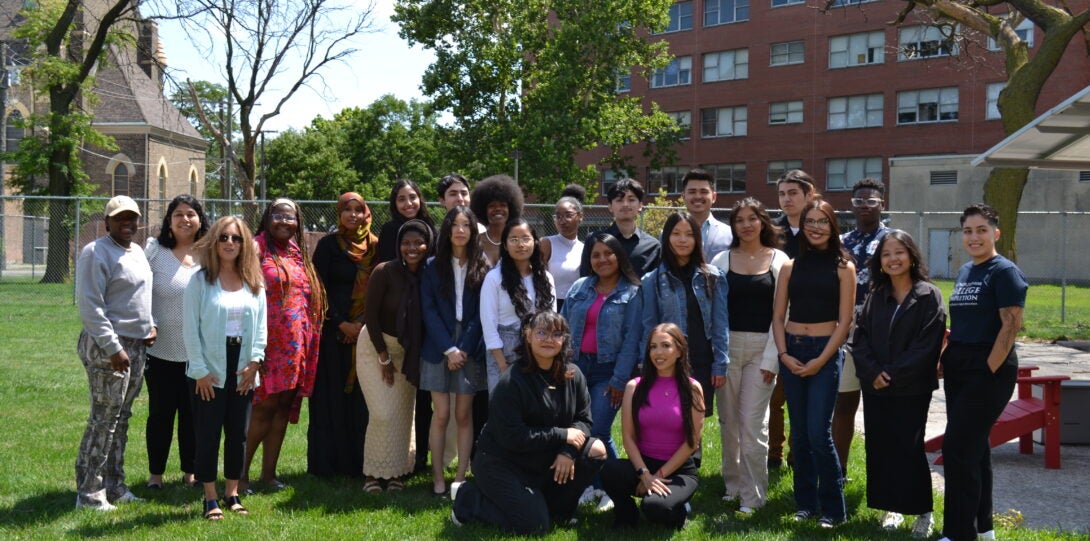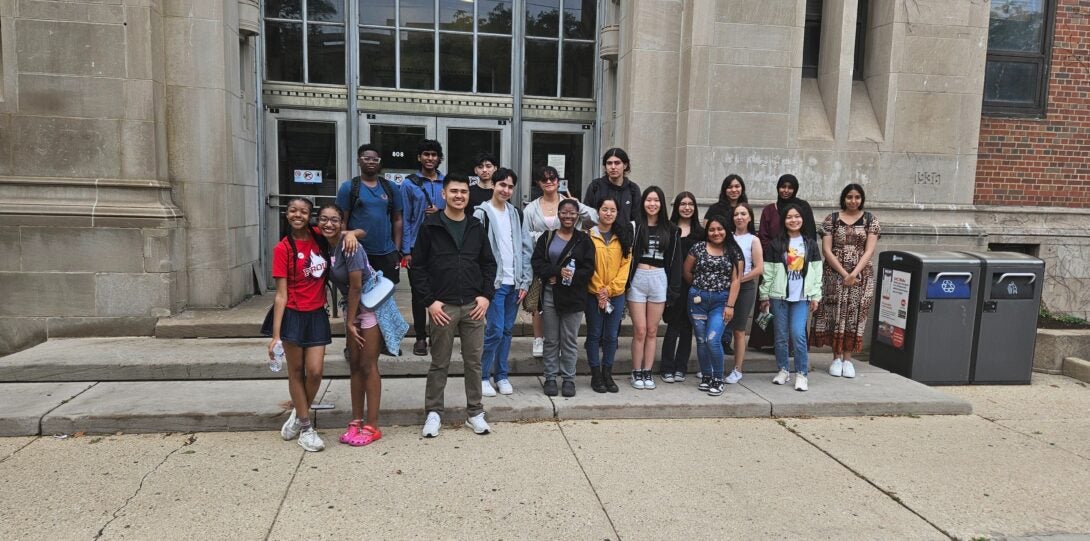Pre-Health Academic Readiness (PHAR) Undergraduate Summer Program
What is PHAR?
What is PHAR?
In collaboration with the Urban Health Program (UHP), the University of Illinois Chicago School of Public Health (SPH) is hosting an in-person four-week summer Pre-Health Academic Readiness (PHAR) program from June 23 – July 18, 2025, for incoming admitted first-year undergraduate students who are enrolled in public health or interested in public health and/or pre-health programs at UIC. The goal of PHAR is to help students strengthen their academic proficiency and professional and social skills.
PHAR students will collaborate with School of Public Health faculty and staff to explore UIC and campus resources, build meaningful connections with peers and mentors, and enhance their readiness for a career in public health or healthcare.
Program Details
-
1st year undergraduate students only.
-
4 week summer program from June 23 – July 18, 2025.
Program Details, continued.
-
9 a.m. to 4 p.m. Monday to Thursday
-
Stipend available based on program attendance and participation.
Program Goals
-
Academic readiness
Provide resources, tools, and connections to enhance academic readiness and success.
-
Networking
Opportunities to meet peers and the UIC community.
-
Math and writing
Strengthen math and writing related to literacy and numeracy in public health (statistics, graphs, citation styles, research papers, personal statements, resumes, and more).
Program Goals, continued.
-
Leadership
Enhance students’ leadership development skills by working individually and in groups to design approaches to addressing public health disparities.
-
Public health skills
Understand factors that influence health and health outcomes.
Program Modules
-
Academic skills Understanding a syllabus, Blackboard, reference managers, library resources, time management, study habits, etc.
-
College transition Learning about UIC and various resources/campus partners, financial literacy, high school vs college expectations, importance of advisors and more.
-
Career exploration Exposure to various careers in public health and other health science fields.
Program Modules, continued.
-
Leadership skills Networking, communication, conflict resolution, mental health first aid training and more.
-
Public health skills Public health is everything! Learn why!
Eligibility Requirements
To participate in the Pre-Health Academic Readiness (PHAR) program, students must verify the following:
- Be planning to matriculate/attend UIC in Fall 2025 as an incoming first-year undergraduate student
- Must meet educational and/or income requirements (described by HRSA Eligibility Requirements below)
- Be a citizen, non-citizen national of the United States, an individual lawfully admitted for permanent residence to the United States, or any other “qualified alien” under section 431(b) of the Personal Responsibility and Work Opportunity Reconciliation Act of 1996, Pub. L. 104-193, as amended. Individuals on temporary or student visas are not eligible to participate due to our funding restrictions from the Health Resources and Services Administration
HRSA Educational and Income Requirements
Economically Disadvantaged
Individuals are considered from an “economically disadvantaged” background if they come from a family with an annual income below a level based on low-income thresholds, according to family size established by the U.S. Census Bureau, adjusted annually for changes in the Consumer Price Index, and adjusted by the Secretary of the U.S. Department of Health and Human Services (HHS), for use in all health professions programs. The Secretary updates these income levels in the Federal Register annually. The Secretary defines a “low-income family/household” for various health professions programs included in Titles Ill, VII and VIII of the Public Health Service Act, as having an annual income that does not exceed 200 percent of the Department’s poverty guidelines. A family is a group of two or more individuals related by birth, marriage, or adoption who live together. A household may be only one person. Please utilize the 2024 Poverty Guidelines published by HHS, to determine if you can claim an Economically Disadvantaged status.
Educationally Disadvantaged
Individuals are considered from an “educationally disadvantaged” background if they come from a social, cultural, or educational environment that has demonstrably and directly inhibited the individual from obtaining the knowledge, skills, and abilities necessary to develop and participate in a health professions education or training program. Applicants must use the criteria below to claim Educationally Disadvantaged backgrounds.
You must meet one or more of the following criteria to qualify under the educationally disadvantaged background status:
- Is first-generation in their family to attend college. Please note, the most recent annual data available for the following criteria is found on the state Department of Education website where the student last attended or graduated from high school. The threshold for “Low” is determined by each individual state.
- Graduated from (or attended) a high school, based on the most recent annual data available, which either had a:
- Low percentage of seniors receiving a high school diploma; or
- Low percentage of high school graduates who attend college the following year after graduation
- Graduated from (or attended) a high school with low per capita funding.
- Graduated from (or attended) a high school where – based on the most recent annual data available – many of the enrolled students are eligible for free or reduced-price lunches.
The University of Illinois Chicago Urban Health Program Health Careers Pathway Program is sponsored by a Health Careers Opportunity Program Grant (#D1850073) awarded to the University of Illinois Chicago College of Dentistry from the Health Resources and Services Administration.
Application Process
Applications for summer 2025 are now open!
Please submit your application here. The application priority deadline is May 1, 2025, 11:59PM CST.
If you are interested in learning more about the program or have any questions, please contact phar@uic.edu.

